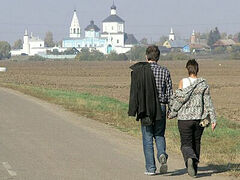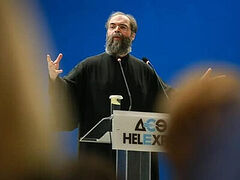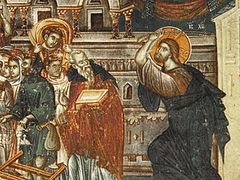We talked with Fr. George Maximov on a range of subjects—from the crisis of faith in our young people to criticism of the Church by “experienced theologians” and pastor “burn-out”. In his usual manner, referring to Patristic teaching, he calmly and clearly gave an answer to the burning question of the time: What is Church modernism? Are those who have an uncompromising attitude towards this phenomenon right? And is it possible to reconcile a modernist with the Church’s teaching, allowing criticism of some details of the teaching? But the main leitmotif of our conversation was the conviction that never before had there been so many favorable opportunities for confessing the Orthodox faith, for the whole life of an Orthodox Christian. In Fr. George’s (and not only his) view, we have been given this time through the prayers of the New Martyrs. And how important it is to live through this time with grace and gratitude to God!
On why priests leave the Church
—Sometimes, unfortunately, the following situation occurs: A person leaves the Church, abandons his monastic, pastoral ministry. Recently such things have taken place publicly: A famous personality declares that they he’s understood, realized something and that he is now changing his life; There are those who have “reconsidered” things, and some have become disillusioned with Church teaching. It is rather hard to discuss such things. These facts seem to indicate some kind of global phenomenon in our life.
—Examples of priests leaving the priesthood were known in the past as well. They were certainly known in the fifth century: there are decisions of some Church Councils that dealt with such cases. Before the Russian Revolution there were certain measures on how to treat those who no longer wanted to be priests. So, it’s not a new problem. But perhaps it is more widespread these days. In my view, these are the consequences of an imperfect practice of ordination (particularly in the 1990s) that we had for obvious reasons [i.e., there was a shortage of priests.—OC]. But, in all fairness, this doesn’t only apply to the 1990s—it is stilling happening today to some extent. I listened to some interviews of former priests who had abandoned their priesthood and I could see that, strictly speaking, they shouldn’t have been ordained in the first place.
One of them claimed that already as a teenager he had stopped believing in God as He was described in the so-called “school theology.” By the way, contemporary modernists criticize this term and disdain it, but it is real theology. You can see what that person chose from the very beginning of his life in the Church: “I believe in this, but I don’t believe in that.” Of course, a person with such a worldview isn’t ready for the priestly ministry!
It is little wonder that he came to this conclusion: “Well, if I didn’t believe this (some of Christ’s words) earlier, why can’t I disbelieve these other words of Christ?” This is just a logical continuation of the wrong direction his soul had taken even before the ordination! And no matter how much I looked, I saw it everywhere.
Modernism corrodes faith like rust. And in every case I observed this in, the was precisely reason why they left. We are talking about instances when priests voluntarily left the priesthood. But there are also cases when priests fall. This may can happen not only to a modernist—falls lie in wait for everyone. I know such examples.
A priest who stops serving as a priest because he fell into fornication doesn’t flaunt it. He doesn’t show off his abandonment of the priesthood. When it comes to the demonstrative abandonment of one’s priesthood—as much as I studied this I have seen one thing: They are always modernists. These people had defective faith and they just shouldn’t have been ordained. If their faith became defective during their priestly ministry, this should have received attention, and either an explanatory conversation should have been conducted with them or they should have been suspended from the ministry. They should have been given the opportunity to think, without defrocking them. If you are in some spiritual crisis, then stop, study, think, consult with knowledgeable people. But in such a state, it is wrong for you to guide the souls of the faithful!
But who deals with such things here? No one does. Nobody even pays much attention to this. One could blame the circumstances of the 1990s, but almost thirty years have passed since then. I think that if we continue to ignore such situations, the problem will remain. Individuals who were ordained with such worldviews will abandon their priesthood.
The rust of modernism
—Modernism is spiritually dangerous. Many people think that we are constantly just “finding fault with” modernists, and they claim that “it’s just a different, alternative view of Orthodoxy.” And we, as they say, “backward Orthodox conservatives”, don’t like it, and that’s all!...
—I often hear this, even from people close to me: “The apostles were human, and they could also be wrong! And their Epistles aren’t the ultimate truth! And the Evangelists could be wrong! So, we don’t have a so-called ‘canonical Gospel!’” If we think like that, we can start questioning everything!
—When a Christian starts talking like this, when he begins to question our Scriptures and Tradition (especially if he is a priest), this means that he has already embarked on the path of modernism.
As for those questions you cited… I usually answer them this way: “Can’t you be mistaken?” They rarely say such things about the apostles, but it is often said of the holy fathers: “The saints could also be mistaken.” This is what people say who don’t like some patristic teaching. I ask them, “If the saints erred, couldn’t it be possible for you to err? Who is more likely to err—you or a saint, or the host of saints?” And, even without considering specific quotes, it’s quite obvious that you’re more likely to be mistaken than the saints!
Continuing on the theme of modernism, I want to mention why there is spiritual danger in it. Because a truncated, distorted Orthodox faith, a certain ersatz or stub of it—which the modernists propose rebuilding for themselves—is deprived of the power of grace. It stops filling people with grace, spiritual joy and the power of God. People stop receiving all of this.
It doesn’t mean that a person will immediately feel that just yesterday he was full, but today he has suddenly become empty. It’s because there is such a thing as enthusiasm. Someone can be inspired with Christianity in a purely human way, just as some get inspired, say, by playing the ukulele. You like it, you are carried away, and you will enthusiastically learn to play all day long. Or, let’s say, you’ve been carried away by some historical topic. For example, you’re interested in the wreck of the Titanic, and so you sit day and night immersed in it, you’re so captivated by the subject! You don’t mind devoting your time and energy to it and you are absorbed in it for a while.
Likewise, a modernist can be interested in Orthodoxy for a while out of sheer enthusiasm. But, unlike grace, enthusiasm is sure to run out. Some modernists call it “the professional burn-out of priests.” But it’s not a “burn-out of priests”; rather, it means “your modernism has burned out!” The grace of God never burns out. Human and purely psychological enthusiasm does.
For example, such young man enters a seminary. He holds modernistic views, his thoughts regarding theology are muddled, and he gets his ideas of God from various sources. Later he graduates from the seminary and is ordained. At first, he is pleased with everything—everything is new and inspires him. Then it becomes old hat. And, most importantly, his enthusiasm runs out! He begins to ask himself, “Why do I need all this?” He begins to try and find other ways out for himself. Many priests are fond of psychology, and this is understandable because a person is trying to compensate for something, to find something new. But I think this will burn out too. I have spoken with professional, highly qualified psychologists, and they have a low opinion of former priests’ attempts at psychology. Such a story will repeat itself over and again—not necessarily with psychology—perhaps with something else. The point is that this rust of modernism deprives a person’s faith of nourishment from the Lord.
—And who is a modernist?
—A modernist is someone who says, “The Lord said this, but I think otherwise!” For example, the Lord says: Except a man be born of water and of the Spirit, he cannot enter into the Kingdom of God (Jn. 3:5); while a modernist says “I think otherwise: they will enter, they must enter.” But how proud a person must be to deliberately contradict Christ Himself! And we know from the Holy Scriptures that God resisteth the proud, and giveth grace to the humble (1 Pet. 5:5)!
So the question of modernism is not just a question of intellectual opinions; it’s also a question of spiritual problems and human spiritual defeat.
—It’s strange that many of us, even gifted, distinguished and enlightened people, fail to understand such simple things…
—Well, there are many reasons for that. One of them is that a lot of modernistic literature is being spread in our days. But not only that. Why is modernism popular? Because it is basically an attempt to adapt the Gospel to this world in order to please this world. So there will always be those among Christians who will feel the desire to be friends with both God and the world—though we know that’s impossible. The friendship of the world is enmity with God (Js. 4:4). But they have this desire.
Learn and not teach
—There’s another reason: It is hard for someone who has come from the world to humble himself. It is hard for all of us (not only for modernists) to humble ourselves, but this is what the Lord calls us to do. We should come to the Church as disciples and not as teachers.
There are those who seem to be learning at first, but they say to themselves: “Okay, I’ll accept this; but there they seem to be mistaken, so I disagree with that.” And later you see him teaching others, teaching the Church! He has just come in sin, in life’s dead ends into which he took himself by his sins, asking God for help. God helped him, brought him to the light, but suddenly he straightens his shoulders and begins to teach the Church! He teaches what it should be like—what its teachings, services, and prayer should be. But wouldn’t it be better for him to ask himself, “Who am I to judge?” Even if you haven’t yet taught publicly, haven’t written about this or spoken to anyone, if you have made yourself a judge only in your mind, this is already a reason to think, “What’s wrong with me?”
And why else is this happening today? Modern culture drives us to pride. We are all induced, infected with pride from childhood. That’s why it is hard for us to humble ourselves. Pride has always been inherent in the human race since the fall; it was present in ancient generations, but not to such an extent. Ancient people were generally more prone to humility and trust. The whole surrounding culture convinces us that you are the center of the universe, the lord of creation, and the measure of all things. The way you think is the most correct way.
But when a person converts to God, he must collect all this and throw it into the trash—all these ideas and beliefs that he is the main value and the whole world revolves around him. He must sit down at Christ’s feet and learn! He must learn to be silent, to listen and change his views. “The Lord says thus, but I thought differently. I was wrong!” We need to take what the Lord says with childlike trust. And this brings down grace! If only everybody knew how much grace this brings! Because every time we humble ourselves this way, we cleanse our minds and hearts. We offer sacrifice to the Lord when we sacrifice our views and ideas. The Lord accepts our sacrifice and gives us His grace, despite the fact that we are as weak and unworthy as any modernist! Spiritually, we are no better than them—not in any way! The point is in how we treat the teachings of the Lord and the Lord Himself!
I have personally known and know even now many who have gone through crises, and I worry about them. I saw what a person was like when he was a disciple, and then what he became when he imagined himself to be a teacher and judge of the Church! That’s a terrible sight! I am very sorry for such a person! It’s a pity that he didn’t remain as ardent and bright as he initially was! But, oddly enough, since the person himself embarked on this pernicious path of corrupting the faith, he may have not noticed this! He may not notice these changes in himself. And even if he does notice, he doesn’t associate these changes with his spiritual damage. To the contrary, he then begins to look for weaknesses in the Church. But one mustn’t shift the responsibility for his own problems onto the Church!





